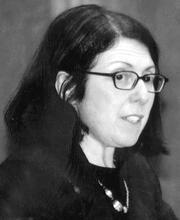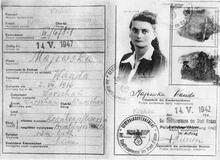Liudmila Ulitskaia
Liudmila Ulitskaia was born in 1943 in Davlekanovo, where her family was evacuated during World War II. Trained as a biologist, she graduated from Moscow State University in 1967 with a degree in genetics. Her smashing long-form fiction debut came with the publishing of Sonechka (1992), a novel following a Jewish women’s life as a secular hagiography. The Funeral Party (1998) explores the development of surrogate families. Medea and Her Children (1996), The Kukotskii Case (2000), and Sincerely yours, Shurik (2004) are considered multigenerational family sagas. Having lived through the Soviet period of repression, Ulitskaia entered the current Russian climate as a public intellectual and writer whose literary writings addressing politics and religion have confronted the increasingly conservative political repression of Vladimir Putin’s Russia.
In 2001 Liudmila Ulitskaia became the first woman to be awarded the prestigious Russian Booker Prize for The Kukotskii Case (Kazus Kukotskogo). She had been short listed for that prize twice before—in 1992 for Sonechka and in 1997 for Medea and her Children (Medea i ee deti). Sonechka also received the Medici Prize in France and the Penne Prize in Italy. Ulitskaia’s works are published in numerous formats and editions by two of Russia’s leading publishers and are well received in translation abroad. Ulitskaia is one of the best and most popular representatives of contemporary Russian realist prose; her works combine traditional plot and narrative techniques with an unusually candid treatment of conventionally taboo subjects such as sexuality and disease, as well as previously censored topics in Russian history and religion.
Family and Early Life
Liudmila Evgenevna Ulitskaia was born on February 21, 1943, in the village of Davlekanovo in Bashkiriia, where her family was evacuated during World War II. Both of her parents came from Jewish families and were educated professionals—her mother a biochemist who worked in pediatric medical research and her father an agricultural machine engineer. Ulitskaia’s parents divorced when she was young and she grew up with her grandparents in Moscow, where she still resides. Both of her grandfathers spent much of this time in prison for political unorthodoxy. Although both of Ulitskaia’s parents lost their jobs in the 1950s during Stalin’s “anticosmopolitan campaign,” Ulitskaia herself encountered no obstacles to education or employment.
Ulitskaia attended Moscow State University and graduated in 1967 with a degree in genetics. Married once while a student, her second marriage was to a physicist and fellow genetics researcher with whom she had two sons. Ulitskaia worked in a genetics laboratory that was shut down in the early 1970s after several of its members were found to be translating, typing, and sharing manuscripts of forbidden foreign works, including Leon Uris’s Exodus. Although prevented from working during the 1970s, Ulitskaia suffered relatively few consequences after the incident, apart from losing her job and her typewriter. In 1979 she found work doing research for the Moscow Jewish Theater. She then began writing film scripts before turning to fiction. She is now married to successful Moscow artist Andrei Krasulin. The two enjoy a productive artistic relationship; in November 2000 Krasulin exhibited sculpture and collage made entirely from manuscripts of Ulitskaia’s most recent novel. Both of her sons spent considerable time in the United States but have since returned to successful careers in Moscow.
Literary Themes and Devices
Ulitskaia’s characters come from the fringes of Russian society. Her protagonists—most often female—are Jewish, Central Asian, or Crimean Russians of Greek descent. Her works often have a historical dimension: one of her most frequent devices is to review Soviet history by tracing the life of an elderly character from pre-Revolutionary times to the present of the narration. Events of national importance are relegated to the background as she emphasizes private life and the personal development of her characters. For example, Stalin’s death recurs in her prose as an event in the context of which children discover their identities vis-à-vis the state. Faith and morality also figure prominently in these works. Her characters frequently do not espouse traditional Jewish or Christian beliefs; rather, they tend to develop idiosyncratic forms of faith and morality, often through real or imagined contact with a world beyond this one.
The theme of the family in twentieth-century Russia pervades all of these works. This is a crucial theme in Russian literature of the twentieth century as Soviet—especially Stalinist—policy officially fostered a sense of allegiance to the state as “family” over any personal ties. Ulitskaia’s earliest short stories, published individually in literary journals and as a collection in 1993 in France and 1994 in Russia, depict the struggle to find family from the Stalin era through the 1970s period of “stagnation” to post-Soviet times. These stories are both grotesque and uplifting. In “Gulia” an elderly, decrepit, yet refined lady finds sexual comfort in the arms of her best friend’s son. “Bron’ka” is the story of a teenage girl who guards the secret of who fathered the four sons she gave birth to in four years, protecting the story of her romance with an older man—a photographer who recreated pre-revolutionary times through his art.
Novels and other Writings
Ulitskaia’s two novellas of the mid–1990s also trace the development of surrogate families. Sonechka presents the life of the title character as a secular hagiography. Episodes from the Jewish girl’s childhood are given the flavor of Christian topoi: she renounces life in favor of reading classics of Russian and world literature; she suffers blows at the hands of a classmate—her first love. She marries an eccentric, successful artist and remains devoted to him even when he leaves her for their daughter’s promiscuous best friend. In the end, widowed and without her daughter, who emigrates to Israel, she ends her life living with and caring for the very girl her husband loved and returning to the comfort of fictional worlds. The Funeral Party (Veselye pokhorony, 1998) is set in New York, where a Russian émigré artist beloved by a motley group of friends—mostly émigrés—is dying of a mysterious degenerative disease. His death becomes an occasion for celebration of a newfound sense of connectedness and rebirth for the many characters introduced in the short work.
Medea and Her Children, The Kukotskii Case, and Sincerely yours, Shurik (Iskrenne vash, Shurik, 2004) may all be considered multigenerational family sagas. Though maintaining a focus on a single character—Medea Mendez, Pavel Kukotskii and Shurik Korn—each work provides a historical outlook on that character’s development and presents a panoramic view of ancestors and descendants. Although Ulitskaia prefers shorter forms, these novels are her most sophisticated narratives, offering multiple, opposing points of view, overlapping times and tenses, and a blend of the seemingly mundane with visitations from metaphysical planes.
Selected Works by Liudmila Ulitskaia
Russian
Bednye Rodstvenniki (stories), 1994.
Medea i ee deti: povesti (stories and novel), 1996.
Veselye pokhorony: povest’ i rasskazy (novella and stories), 1998.
Lialin Dom: Povest’ i rasskazy (novella and stories).
Kazus Kukotskogo (novel), 2000.
Skvoznaia liniia: povest’ i rasskazy (novella and stories), 2002.
Iskrenne vash Shurik (novel), 2004.
Translations into English
Sonechka and Other Stories, tr. Arch Tait. Moscow and Chicago: 1998.
The Funeral Party, tr. Cathy Porter. New York: 2001.
Medea and Her Children, tr. Arch Tait. New York: 2002.
Goes, Gudrun. “Erzahlen über Medea.” In Erzählen in Russland, edited by Rolf Herkelrath, 213–224. Frankfurt: 2000.
Goscilo, Helena. Dehexing Sex: Russian Womanhood During and After Glasnost. Ann Arbor: 1996.
Goscilo, Helena. “Perestroika and Post-Soviet Prose: From Dazzle to Dispersal.” In A History of Women’s Writing in Russia, edited by Adele Marie Barker and Jehanne M. Gheith. Cambridge: 2002.
Gosteva, Anastasiia. “‘Prinimaiu vse, chto daetsia.’” Voprosy literatury 1 (January–February 2000): 215–237.
Kuklin, Lev. “Kazus Ulitskoi.” Neva 7 (2003): 177–183.
Kukulin, Il’ia. “‘Nikakikh khimicheskikh vozdeistvii.’ Liudmila Ulitskaia stremitsia uvidet’ zhizn’ s zapredel’noi tochki zreniia.” Nezavisimaia gazeta, no. 236 (2001): 9.
Parnell, Christina. “Hiding and Using Sexuality: The Artist’s Controversial Subject in Modern Russian Women’s Literature.” In Gender and Sexuality in Russian Civilisation, edited by Peter I. Barta, 311–324. London: 2001.











